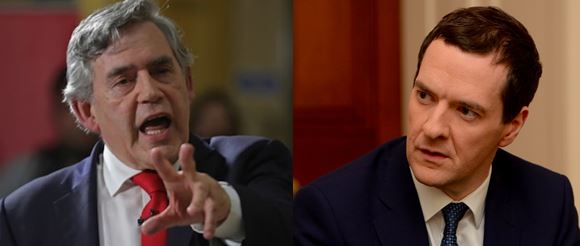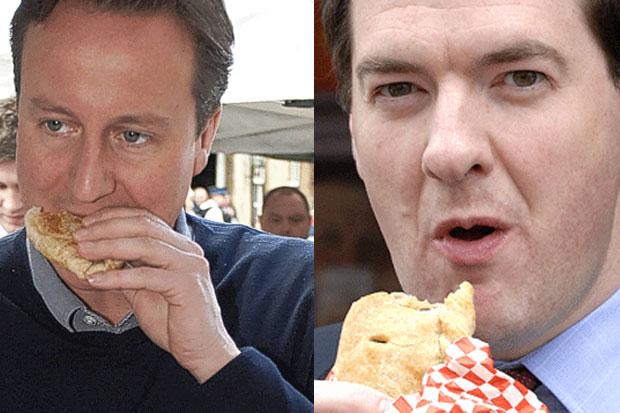For well over a year, I’d been planning to write a blog post on Gordon Brown: his time as Chancellor and PM and his legacy. And then, about three weeks ago, Polly Toynbee, prompted by the publication of Brown’s autobiography, writes a piece for the Guardian along practically identical lines to what I’d planned. Serves me right.

So, in the light of last week’s budget, I’m writing a slightly different piece, comparing Brown to his successor-but-one, Gideon George Osborne. Two very different personalities with very different legacies. It’s a case of chancellor v chancer.
Personalities
Gordon Brown always comes across as a product of his modest but comfortable Scottish Presbyterian upbringing. Instinctively frugal, with a concern for the betterment of the lives of his fellow human beings, I feel he developed a strong ethical code to guide his life. Brown was brought up to be straightforward, to tell the truth and always do the right thing. He appears naturally shy and reports by those who know him say he comes across as a much warmer person in private than his public persona. Not obviously gregarious, he was suspicious of the motives of his closest colleagues, which increased during his time as PM almost to the level of paranoia.
George Osborne, by contrast, is a whole different kettle of fish. Polished and self-confident, he carries a powerful air of entitlement common to those who were educated at a posh school: St Paul’s in his case. He carried with him into Parliament an absolute conviction that he was born to be part of the ruling class. Isolated from any but the most privileged, he has never shown any interest in the needs and concerns of all but the richest and most privileged. By happy coincidence, these are the people who fund the Tory party. Along with Boris Johnson, Osborne above all shows the most utter contempt for the truth: any lie will do as long as it serves his own purpose. Perhaps the two most egregious are these: firstly that Labour were responsible for the global financial crisis of 2007-8 and secondly, by conflating fraud and administrative error, gave a totally misleading impression of the level of benefit fraud. (The much-bandied misleading figure was £5 billion, only 20% of which is fraud, some 0.7% of the total benefits bill.)
Rabbits and Hats
Different though their personalities are, both Brown and Osborne share one thing in common. Both could not resist the temptation, on Budget day, of making the Budget speech into a theatrical event. Both would spring the odd eye-catching announcement, like a rabbit from a hat, intended for maximum political effect, even when the economics was dubious. And both carried great political weight and authority within their respective Cabinets.

Another thing in common is that both Georges are history graduates: Brown with a first-class MA and a PhD from Edinburgh and Osborne a 2:1 from Oxford. (Although Osborne’s degree was in modern history, I can’t help imagining that his favourite read was The Prince by Niccolo Machiavelli.)
The similarities end here. So what is my verdict on their performances as Chancellor of the Exchequer and on their subsequent legacies?
The Chancellor
For Brown, I distinguish his time as Chancellor between pre- and post-financial crisis, the latter including his time as Prime Minister. In summary, my overall verdict for the first phase is “mixed”. For the second phase, I believe that Brown was the most authoritative and respected financial leader in the western world.
The first period included policies which I would count against Brown. Together with Tony Blair, he accepted the basic tenets of Thatcher-Reaganite Free Market Fundamentalism and only watered them down a bit. Direct taxes were lowered somewhat and no serious attempts were made to rebalance the UK’s lopsided economy away from over-reliance on services and financial services in particular. Worse still, Brown expanded the use of Private Finance Initiatives (PFI) as a means of financing many public sector capital projects, to keep down public sector debt. This has left a toxic legacy, most notably in the NHS.
On the other hand, much good was done during Brown’s tenure. Child poverty was drastically reduced from the Thatcher / Major legacy: the proportion of children living in poverty fell by a third. The introduction of Child and Working Tax Credits was a major factor in this. The Institute for Fiscal Studies, Britain’s most respected independent economic think-tank, also notes the drop in pensioner poverty. The IFS too, whilst noting that inequality rose under New Labour, “there is evidence to suggest that these reforms prevented a larger rise in inequality than actually occurred under Labour.” Several other non-fiscal policies funded by Brown’s Treasury, notably Sure Start centres introduced more strategic reforms to bring about long-term improvements to the life chances for children from poorer households. So, overall in the period 1997-2007, the good probably exceeded the bad, but not by much.
That balance changes after the global crash. Whilst Toynbee’s claim that Brown “saved the world” over-dramatizes it a bit, Brown was a key player in stabilising the financial system after 2007. His decisive action immediately after the crash and a package of pro-growth measures turned recession to modest growth. In 2009, he pushed hard for the introduction of the so-called “Tobin Tax”, a very low levy on all financial transactions and named after the economist who first proposed it. The tax is designed to reduce the riskier behaviour of the finance services industry, whose recklessness caused the 2007-8 crash, which started in the USA. Brown seems to have been the first world leader to grasp that things must change. He also was clear that, in order to succeed, reforms needed to be coordinated across a critical mass of the world’s economies. Any one country going it alone could easily be picked off by rogue “beggar my neighbour” states.
In 2009-10, globally Brown seemed to have grown in stature on the world stage as a key influencer of change to the economic order. Tragically, his standing at home was in rapid decline, by a combination of his personality, concerted attacks by the Tory opposition and their more rabid running mates in the press and the accusations of cowardice for not calling a snap election. (Strange how snap elections, or the lack of them, can swing political fortunes in a trice!) His increasing troubles domestically reduced his standing abroad and the opportunity for lasting, international reform was lost. If Brown had somehow managed to win an election in 2009 or 2010, things may look very different today, but the scent of decay and decline for the New Labour project was in the air.
The Chancer
Enter, alas, George Osborne. He lost no time about implementing a new order of austerity. First, Labour’s legacy was trashed. There was the lie, already mentioned, about Labour causing the crash. To make matters worse, who remembers now that shadow Chancellor Osborne promised in September 2007 to match Labour’s spending plans. This was a cynical political move to try to detoxify the Tory brand as the “Nasty Party”. So the lie was, in effect: “It’s all Labour’s fault, but we would have done the same”. Secondly, a coordinated propaganda campaign was remarkable successful in persuading public opinion that it was now all the fault of benefit scroungers: the new “straw man” to deflect blame from his friends – and Tory donors – to the poor. It also provided convenient cover for the long-term FMF project of dismantling as much of the state as possible, for zealous ideological reasons. Reducing the public sector deficit became a total obsession, to the exclusion of other economic objectives.
The effect was to kill the (albeit weak) growth induced by Brown’s and Alistair Darling’s careful nurturing of the post-crash economy. It wasn’t helped by Osborne’s ridiculous and reckless assertion that the UK economy was weaker than Greece’s, which was patently untrue. This helped to flatten business confidence overnight. Actions have consequences, George.
For balance, I’ve tried hard to think of a policy change introduced by Osborne of which I approve. I’ve searched the web to remind me but, sadly, I can’t find anything. Let’s just say Osborne was one of the best of Cameron’s cabinet in modernising the Tories’ position on social policy: for example, he was one of the strongest Tory supporters of same-sex marriage. But on the economy (his day job), no.
Taking spending power from the poorest in society is a good way to reduce demand and shrink the overall economy, as the poor spend a higher proportion of their income. (The rich tuck their spare cash away in safe tax havens.) This, in turn, reduces tax takings and pushes up the government deficit. What’s worse, with lack of growth in the economy, debt as a proportion of GDP is higher than it would be. Osborne famously predicted in 2010 he’d eliminate the deficit in 5 years: he failed spectacularly. We’ll be lucky if we achieve that objective by 2030 on present policies.

Of all Osborne’s budgets, the 2012 “omnishambles” was arguably the worst. He gave us a cut in the top rate of income tax for the highest earners and the failed attempt to introduce the “pasty tax”. Greggs had a field day as politicians fell over each other to be photographed eating a pasty. Not his finest hour!
Legacies and Might-Have-Beens
So, what can we thank these two contrasting characters for, by way of legacy? For Brown, his reforms made significant progress in reducing child poverty (tax credits, Sure Start centres and the rest). But he left vast areas of the public sector saddled with repayments to private sector companies making vast profits from Private Finance Initiative schemes, which Brown expanded significantly. Most importantly, he was quick to improvise policy in unprecedented times of crisis in 2007-8. Whilst painful for the economy, his decisive action saved the UK from a potentially far, far worse fate: a 1930s-style Great Depression.
And as for Osborne? He gave us austerity: a dogma-driven, economically illiterate policy for which he lied that there was no alternative. As well as being morally wrong, it simply doesn’t work. Most economists now accept that this is the case, and some came to this conclusion sooner than others. Here’s a US analysis from four years ago pointing out the failure of austerity. Even now, Chancellor Philip Hammond has left policy largely unchanged, his recent budget just tinkering around the edges. And, of course, austerity has already undone much of the good work on reducing poverty, remorselessly back on the rise.
So the poignant “what might have been” is if Gordon Brown had had more time to lead western opinion to move away from Free Market Fundamentalism, in concert with other nations. This would also have started a measured move for thee UK away from over-reliance on financial services towards a healthier, more balanced economy. We could have had less inequality, less poverty, no EU referendum, no unnecessary trashing of the economy to come after 2019. We’ll never know.